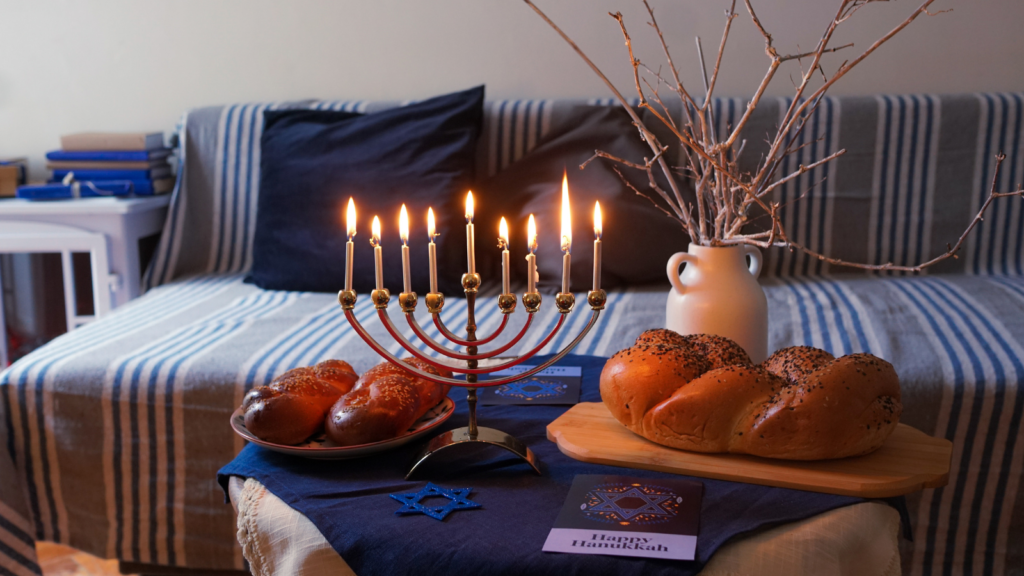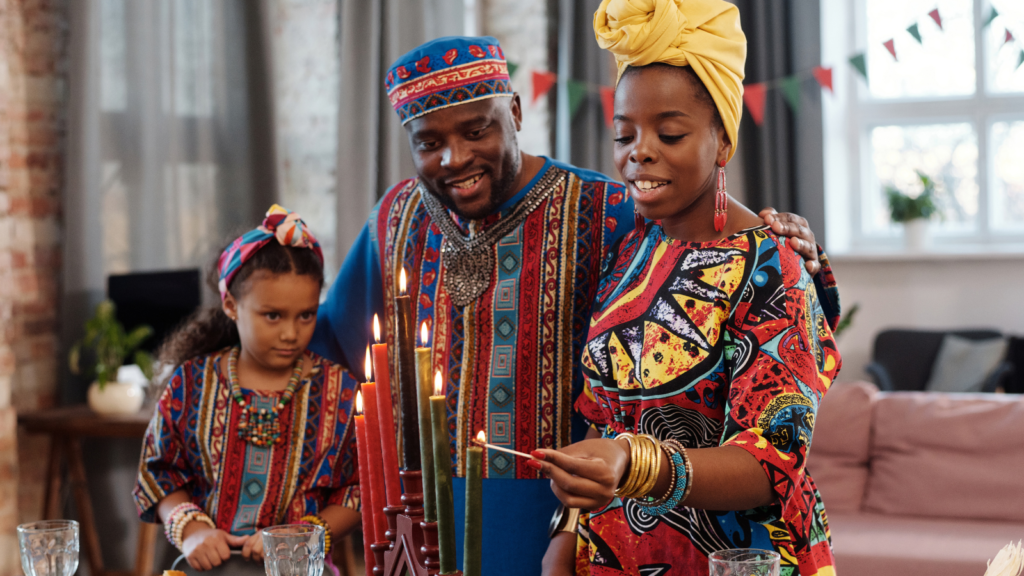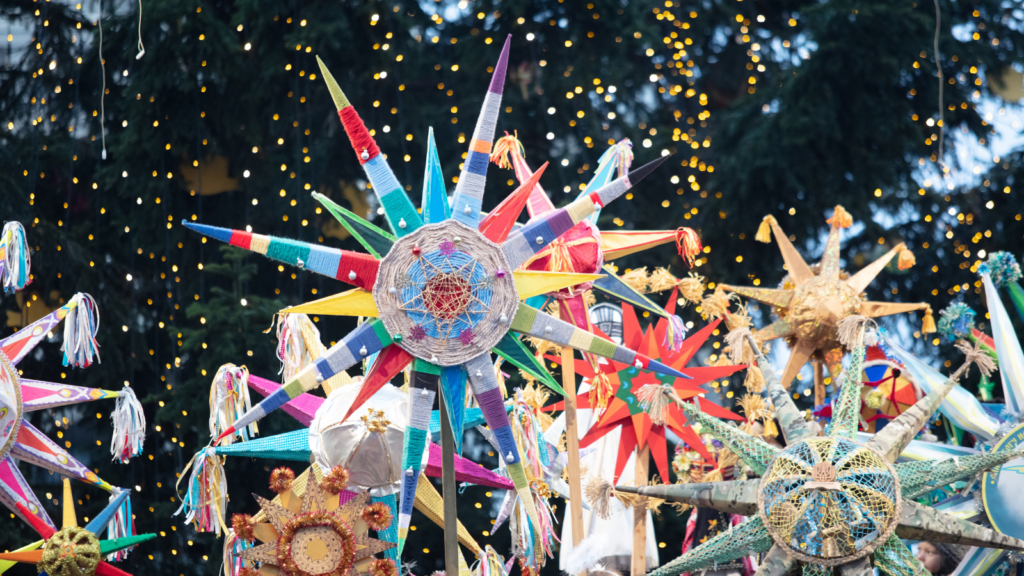In December and January, we acknowledge Hanukkah, Christmas, Kwanzaa and Orthodox Christmas. Read more about each holiday below, written by members of our Inclusivity, Diversity, Equity and Accessibility (IDEA) Committee.
Hanukkah: December 25 to January 2, 2025

Hanukkah, the Festival of Lights, originates from a historical conflict in 175 B.C., when King Antiochus prohibited Judaism in Judea, resulting in the destruction of the Temple of Jerusalem. The subsequent rebellion, led by Judah the Maccabee, culminated in victory around 164 B.C. The unique aspect of Hanukkah lies in the miraculous event involving a single jar of oil found upon the Maccabees’ return to the Temple. Initially sufficient for one day, this oil inexplicably burned for eight days, providing ample time for the victorious Maccabees to secure additional sacred oil. This extraordinary occurrence is commemorated through Hanukkah’s eight nights of celebration.
Today, the festival’s commencement varies in the Gregorian calendar, with the 2024 celebration spanning from December 25, 2024, to January 2, 2025. Traditional practices include lighting a menorah, adding one candle each night, reciting blessings and exchanging gifts. The festival also features festive foods like sufganiyot and latkes, symbolizing the enduring lamp oil. Families partake in spinning a dreidel for chocolate gelt, adding to the rich traditions of Hanukkah.
Christmas: December 25, 2024

Christmas Day is celebrated globally to commemorate the birth of Jesus Christ. It is observed by both Christians and non-Christians as a religious and cultural holiday. Though the exact date of Jesus’s birth is not recorded in the Bible, December 25 corresponds with the traditional date of the winter solstice on the Roman calendar.
As recounted in the Bible’s New Testament, the Christmas narrative aligns with messianic prophecies told in the Old Testament. It was said that Jesus’s mother, Mary, would conceive through immaculate conception and that He would be born in a manager in Bethlehem. Mary and her husband Joseph, though originally from the town of Nazareth in Galilee, were on a journey to Bethlehem to fulfill census requirements decreed by Caesar Augustus. Once in Bethlehem, there was no room for them at the inn, only finding respite in a stable where Jesus would be born. The angels proclaimed the good news of the promised Saviour’s birth to lowly shepherds who then spread the word.
For many people, Christmas is not celebrated as a religious holiday but rather as a cultural holiday full of traditional celebrations with friends and family.
Many traditions accompany the Christmas holiday, such as giving presents, frequently associated with a figure named Santa Claus. Other traditions include the sending of cards to family and friends, parties with good food and drink, and the singing of carols and other songs.
On behalf of the IDEA Committee, Merry Christmas to all celebrating! “Glory to God in the highest, and on earth peace among those whom He is pleased!” (Luke 2:14 ESV).
Kwanzaa: December 26 to January 1, 2025

Kwanzaa is an African American cultural holiday that is embraced in Canada and across the globe. The holiday is dedicated to celebrating African family, community and culture. Dr. Maulana Karenga, the founder of Kwanzaa and a member of the organization Us, established the holiday in 1966–67 as a response to race riots in Los Angeles, aiming to affirm African American culture and foster unity.
Celebrated from December 26 to January 1, Kwanzaa derives its name from Swahili, meaning “first fruits,” and is characterized by a seven-day observance aligning with the seven principles of Nguzo Saba: umoja (unity), kujichagulia (self-determination), ujima (collective work and responsibility), ujamaa (co-operative economics), nia (purpose), kuumba (creativity), and imani (faith). Symbolism during Kwanzaa includes seven community values represented by symbols such as a straw mat, fruits, vegetables, corn, a cup, a kinara with seven candles and homemade gifts. Kwanzaa, spanning seven days, culminates in a vibrant December 31 celebration marked by gatherings in colourful African attire, a festive feast called karamu, and lively music, dance and singing, while the final day, January 1, is quieter and allows reflection on personal goals and aspirations for the upcoming year.
Orthodox Christmas: January 7, 2025

Orthodox Christmas is observed on January 7 by Eastern Orthodox Christians, marking the birth of Jesus Christ. It’s observed as per the Julian calendar, not the Gregorian calendar. This holiday is considered one of the most important in the Orthodox Christian calendar, marked by sacred rites, holy liturgies, and family gatherings. The tradition of observing Orthodox Christmas was carried over to Canada by immigrants from Eastern European countries such as Russia, Ukraine, Serbia, and Greece, amongst others. It continues to thrive in diverse, multicultural Canadian society today.
Check out more Grandview Kids articles
- Team Grandview achieves Accreditation with Exemplary Standing, receiving a perfect score
- “Grandview Kids became my life raft” – International Day for People with Disabilities
- December: Dates of Significance
- From the search for support to finding a village: Celebrating Giving Tuesday
- Scarlett sparkles with hope in every step: Grandview Kids 2025 Holiday Campaign
